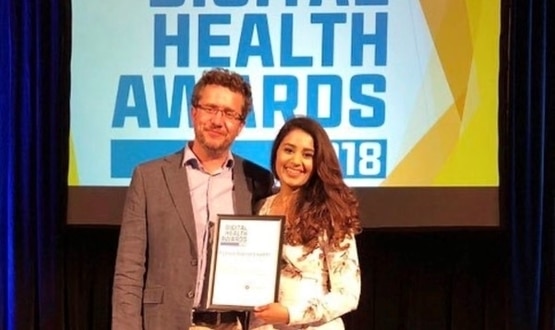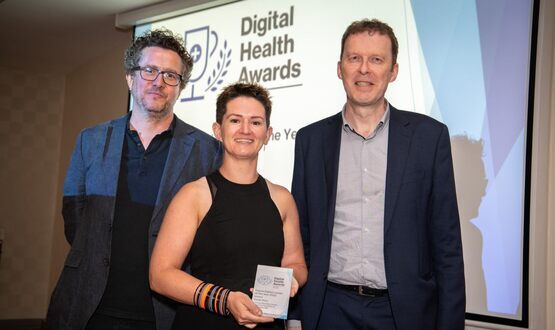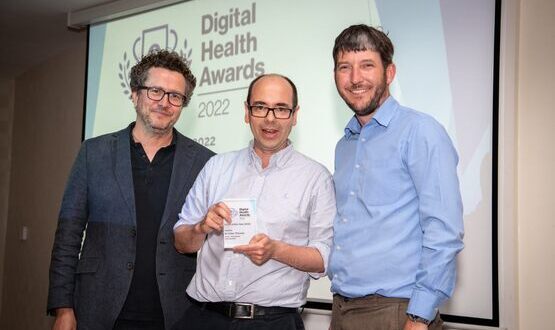Advice from a highly commended future digital leader
- 16 February 2021

Digital Health News recently caught up with Samrina Bhatti, who was highly commended in the ‘Future Digital Leader of the year’ category at the 2018 Digital Health Awards. Samrina spoke to us about her digital journey and what advice she would give her fellow future digital leaders.
Could you explain your health tech journey so far?
I began my career as a clinical pharmacist at Guys and St Thomas’ NHS Trust. It was in this role as a specialist electronic prescribing pharmacist that sparked my interest in big data, health informatics, solutions development and innovation. I became intrigued on new ways we can use technology to improve patient outcomes. With the support of my manager and the CNIO, I started looking into ways we can better utilise data to help prioritise high risk patients. I am a huge advocate of collaborative working so I engaged with others internally and nationally to prevent duplicate efforts. This work led me to be highly commended in the ‘Future Digital Leader of the year’ category at the Digital Health Awards as well as the ‘NHS70 Women Leadership award’ from the London Leadership Academy in 2018.
I went on to become the Chief Pharmaceutical Officer’s National Clinical Fellow and was fortunate enough to lead a national scoping exercise on behalf of NHSX.
It involved engaging with a number of senior stakeholders and health tech enthusiasts to identify workflow challenges nationwide. I published my findings in a national toolkit highlighting the adoption of closed loop medicines administration in the NHS.
After my national fellowship, I supported Bart’ Health NHS Trust with their ePMA benefits realisation and reporting work streams. Alongside this role, I was appointed as the Chief Pharmacy Curator for Medical Realities, Covid Med Ed – a fantastic online platform to enable healthcare workers globally to access medical education resources and tools.
What have been your career highlights so far?
I have to say, one of the greatest highlights was enjoying the company of Dame Sally Davies, when she was the chief medical officer for England. She is an incredible role model for aspiring leaders but also so down to earth. Her work on taking collaborative approaches in tackling global health risks like antimicrobial resistance (AMR) inspired me to look into ways to address global health challenges.
What barriers have you faced in your career?
Change management involves three key areas – people, projects and money!
Healthcare settings have restricted resources with deliverables linked to health outcomes. As an early career pharmacist, carrying out predominantly clinical duties, I was not exposed to the ‘business and finance’ side of change management. I could identify a problem and know how I wanted to fix it, but I was not clear on how I was going to get there in actionable steps.
I realised when bringing about innovation and change with healthcare technology, you need to be able to undertake a number of activities involved the three key areas mentioned above, underpinned by leadership and clinical governance.
This involves engaging key stakeholders, being familiar with business cases, understanding the IT infrastructure, demonstrating positive outcomes as well as carrying out pilot studies and more. This was all new to me, therefore I sought out an internal project management course with the transformation team to enable exposure to all of these areas to deliver change.
Overall, to overcome barriers, it is important to build networks to support delivering your output and to find a channel to influence a favourable outcome, whilst being undeterred by the inertia that permeates the NHS.
What are your next steps?
I have always taken risks during my pharmacy career by taking on a variety of different roles to expand my skill set. I have recently moved on to a new role at the Deloitte Centre of Health Solutions and have been involved in projects across UK and Europe encompassing the healthcare, life sciences and health tech industries.
I am also continuing working on a project with the support of the NHS England Clinical Entrepreneur programme which I can’t say much about at the moment – but watch this space!
What advice would you give the younger generation looking to go into the sector?
I would say, self-reflection and awareness is always a useful tool and can help towards building and understanding yourself as a professional.
Identify your strengths and weaknesses. There are many tools that can help with this, such as the Clifton Strengths assessment. There is a saying that goes ‘if opportunity doesn’t knock, build a door’- take a proactive approach in finding ways to get involved in projects surrounding healthcare technology. This may involve increasing your discretionary effort and putting in the extra hours!
Your on-the-job experience will go a long way towards developing your skills, but in order to consolidate and expand your learning, read around the subject. Lastly, and importantly, find yourself a mentor – having a mentor can bring several benefits to your professional practice. Not only does it give you access to a senior role model who can empower you to excel, they can also help you achieve your career goals and identify areas for development.
Embrace every opportunity; have confidence in your own abilities, undertake continuous learning, self-development activities and be curious – most importantly, enjoy the journey. Because, it really is a great journey!




